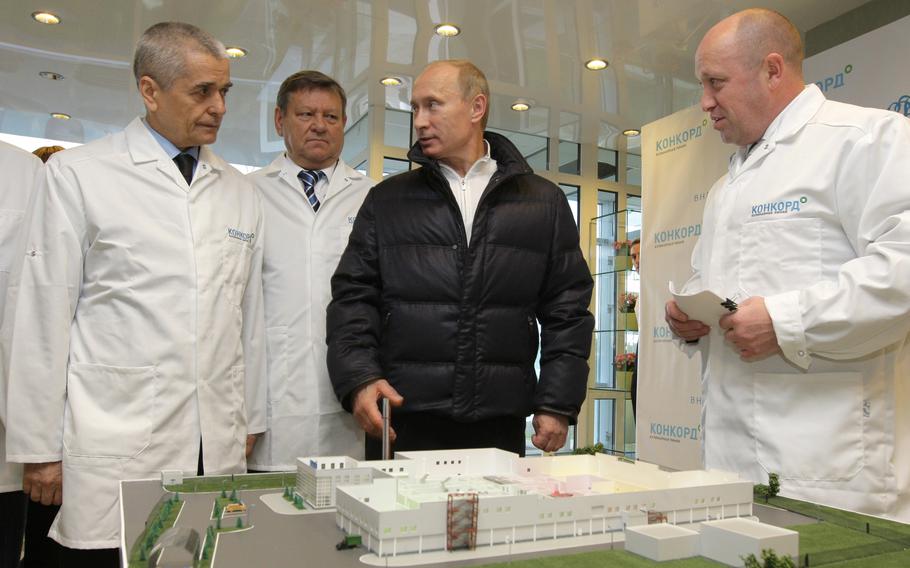
“The key question is: Will it matter?” said Claudia Major, an expert on security policy at the German Institute for International and Security Affairs. “So far, there’s no budget linked to it. There are no new extra resources for the strategy. And implementation is linked to resources.” (Wikimedia Commons)
BERLIN — Germany's long-delayed first national security strategy was released Wednesday describing Russia as the biggest threat to security in Europe but providing few concrete steps — or new funding — to deal with the emerging defense challenges.
Under the tagline "robust, resilient, sustainable," the 74-page strategy lays out Germany's foreign policy and security priorities after Russia's invasion of Ukraine.
"The national security strategy, to make it clear, is not an end point, but a starting point," Chancellor Olaf Scholz said during a news conference to launch the document which stated that Russia is "for now the most significant threat to peace and security in the Euro-Atlantic area."
But while it outlined the world view from Berlin on topics ranging from China to cyber and climate, the policy contained few surprises or detail on how the government intends to proceed on its path toward "more security and less dependence."
"The key question is: Will it matter?" said Claudia Major, an expert on security policy at the German Institute for International and Security Affairs. "So far, there's no budget linked to it. There are no new extra resources for the strategy. And implementation is linked to resources."
The policy comes more than a year since German Chancellor Olaf Scholz announced a Zeitenwende, or turning point, in German security strategy. It then broke the taboo of sending weapons abroad, opting to help arm Ukraine and declaring a more than $1o0 billion special fund for defense.
While it was a major symbolic shift for a country that had long followed a policy of engaging with Russia, Berlin has been criticized for not following up with concrete actions. And the much-anticipated security strategy appeared to do little to change expectations Wednesday and was met with muted reaction in Berlin.
"My fear is that some allies will say: 'It took you one and a half years to do that?'" said Major. "It clearly shows how Germany sees its role in the world. But what's presented is a lot of status quo, while allies will want to know: 'Where do you want to go?'"
The document reiterates Germany's commitment under NATO that the country will spend 2 percent of its gross domestic product on defense but qualifies that commitment by saying it will be met as "an average over a multiyear period."
Initially planned before Russian President Vladimir Putin's invasion last year, the strategy had been delayed by disagreements within Germany's three-party coalition government. Plans for a U.S.-style National Security Council that would centralize decision-making were abandoned because of disagreements over where in government it would be situated.
In Wednesday's news conference, Foreign Minister Annalena Baerbock defended the decision on not pushing ahead with a National Security Council, saying the current system was best for Germany, given that the country did not have a presidential political system. Her party had objected to more power being put in the hands of Scholz's chancellery.
Stung by its exposure to Russian gas at the beginning of the war, it also states Berlin's aim to reduce one-sided dependencies on energy and raw materials.
"The strategy doesn't really provide the kind of new, clear vision for or of Germany which many partners were hoping for and which the country needs," said Benjamin Tallis, a senior research fellow at the German Council on Foreign Relations. "That means continued reactive rather than proactive policy and an ongoing lack of real strategic thinking."
After an initial hesitancy and intense debate over sending heavy arms, Germany was the third-biggest military donor to Ukraine up until February, according to the Kiel Institute for the World Economy. Berlin announced a further $2.95 billion in arms last month, almost doubling its commitment.
But plans to revive and replenish the long-neglected German military, known as the Bundeswehr, are still in their infancy. The German military suffered from years of chronic underfunding, with military chiefs complaining of sparse supplies.
"With the watershed moment that Russia's war of aggression signifies, we have decided to finally equip our Bundeswehr appropriately," Scholz said in the document's introduction. "So that it can perform its core task also in the future: to defend our country and our allies against each and every possible attack."
The plan also outlined aims to "bolster investments in critical-infrastructure protection, cyber capabilities, effective diplomacy, civil protection, stabilizing our partners, and dedicated humanitarian assistance and development cooperation."
But without extra funding, those objectives will remain "aspirations," Tallis said, adding that it does little to assure allies in Central Europe that Germany is cutting a new course.
Even after last year's boost in spending, German Defense Minister Boris Pistorius has said the fund is insufficient to cover the military's needs and is also pushing for an increase of more than $10 billion in Germany's regular budget — currently another source of fractious negotiations within the coalition.
Regarding China, analysts said the paper contained little of surprise, and pointed out that it failed to mention Taiwan.
"We have observed that rivalry and competition have increased in the past years," it said, characterizing China as "a partner, competitor and systemic rival." The national security strategy is expected to be followed by a more detailed China strategy after the visit of Chinese Prime Minister Li Qiang to Berlin later this month.
It is not yet clear "that there is a real plan for how the muddled position on China — still referred to first as a partner — works in practice," said Tallis.